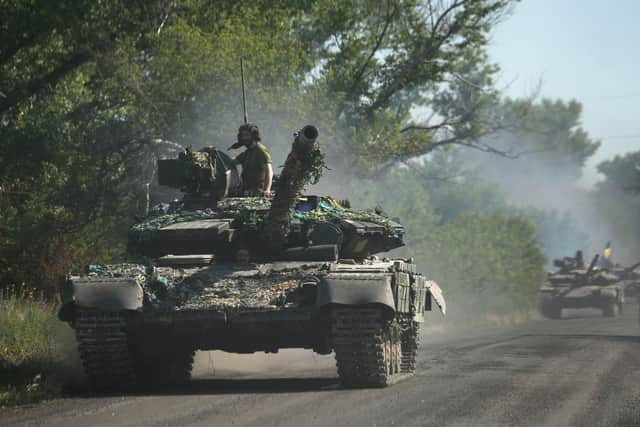What does Russia's partial mobilisation mean for the war in Ukraine? - Patrick Mercer
Russia, conversely, presented the defeat merely as a ‘regrouping’ although the announcement of a partial mobilisation suggests that the Kremlin has had to rethink its plans.
Well, as autumn rains and winter frosts inevitably slow down operations for both sides, how will Russia cope? Undoubtedly, Moscow’s plans for a swift victory haven’t worked out, but there’s considerably more to this equation than a simple withdrawal back to pre 2014 borderlines or a hunkering down over the winter before more blood-letting in the spring.
Advertisement
Hide AdAdvertisement
Hide AdIt’s worth stating that both sides seek to fight completely different sorts of wars. For Kiev, this is an existential, total war which wholly depends upon western backing and increasing numbers of foreign volunteers. Both the economy and the population have been completely mobilised, allowing President Zelensky to talk about putting an army of 1,000,000 in the field.


But, for Moscow, this was meant to be a sideshow. She’s committed far too few men - only about 180,000 at any one point - and tried to move cautiously amongst the largely Russian speaking and mainly sympathetic people over whose homes she’s fighting. This is as far from the storm and hellfire favoured by the Red Army as it’s possible to be - and is heavily criticised by many in Russia as being too soft.
Yet why should a nation whose standing army is over 800,000 strong and who chose to invade in the first place, pussyfoot at all? Well, Russia was hoping to conduct a new sort of war which looked to the long term consequences rather than the short term.
So, a general mobilisation for what was intended to be a big boys’ version of the operations in Georgia, Chechnya or Syria would be politically tricky at home whilst a highly destructive blitzkrieg would alienate the very people Moscow had intended to ‘liberate’. That’s why Ukraine was deemed a Special Military Operation (SMO) rather than an all-out war.
Advertisement
Hide AdAdvertisement
Hide AdSo, the two extremes Russia balanced against each other were the bloody quagmire of Afghanistan in the 1980’s and the conversely bloodless victory in Crimea in 2014. The decapitation of the Kiev government quickly failed, but if the Donbass and the coastal regions west and east of the Crimea dubbed ‘Novorussiya’ could be ‘liberated’ or dominated without too much collateral damage and civilian death, then a long term occupation should not face an insurgency. Similarly, the grinding stream of casualties and public dismay such as the Red Army saw in Afghanistan and which contributed so heavily to the collapse of the Soviet empire might be avoided.
The trouble is, it’s not working. Russia now paints herself at war with the West and NATO, not just in Ukraine but in Syria as well, with the prospect of a long campaign, endless sanctions and a heavy drain on an already creaking economy. So, as Kiev seems to be seizing the initiative, what’s next for Moscow?
She could withdraw, of course. But, would scuttling to the pre-February demarcation lines and reaching an accommodation on the Donbass work? I doubt it; Ukraine would be seen to have won and would press on to the Crimea - a jewel that will never be surrendered and which would certainly cause President Putin to fall. No, there was only going to be one way ahead for Russia: more war. That’s why, in a speech last Wednesday, President Putin announced a partial mobilisation of reservists which would give Russia another 300,000 troops - but they will take some time to reach their units.
And this may not be fast enough, for there’s suddenly a new urgency on both sides. Luhansk, Donetsk, Zaporizhzhia and Kherson - the sprawling districts where the fighting is most intense - have demanded referenda with a view to becoming part of Russia itself.
Advertisement
Hide AdAdvertisement
Hide AdRegardless of the legitimacy of this, the result is important for once these areas are embraced by the motherland, any attack upon them becomes an assault upon Russia herself. It may seem like time- wasting bureaucracy, but their admission would enable Moscow to flood these areas with Regular units rather than the militias and volunteer units that are currently bearing the brunt - hence the partial mobilisation.
Now this has both infuriated and spurred the Ukrainians on. With the example of Crimea in 2014 in mind when a treasure was swiped from Kiev’s hold with barely a murmur from the West, President Zelensky is determined to wreck the referenda by a decisive assault, the most likely objectives being Melitopol, Mariupol or both. If Ukraine can cut the land bridge to Crimea in two and retake both cities it’s hard to see how Russia’s operation could continue.
In Kharkiv Ukraine proved how quickly and devastatingly she could strike, but that thrust along with her other offensives killed a lot of her best troops. Meanwhile, the units that are being prepared for this next assault have not yet received more Western weapons or reinforcements, yet they’ve got to assault immediately if Russia’s plans are to be smashed.
The next few days will be decisive. Russia knows the attacks are coming whilst Ukraine is gambling that momentum will compensate for her lack of artillery and aircraft. One thing is certain, though: a whole swathe of young men will never see their families again.
Patrick Mercer is a former MP for Newark and Army colonel.